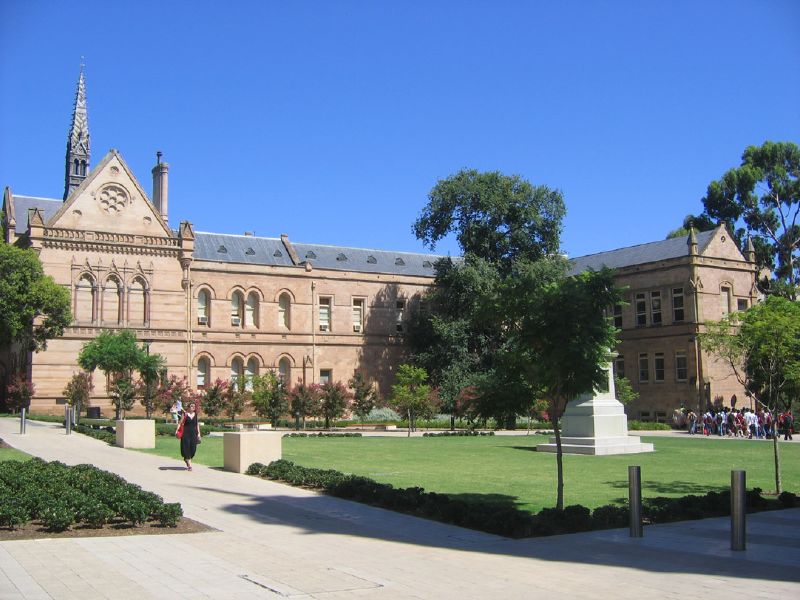The Politics of International Studying: Destinations of the Future
As we continue on from our last article where we discussed How Present-Day Politics May Affect International Language Studies, we understand that studying abroad is about more than getting an education. It is about broadening your horizons, experiencing new cultures, and often getting to grips with a second language. But with all of the political changes set in place in 2016, we have begun speculating if the flux of international students across the globe might now change. What impact is that going to have on our languages?
Australia
 University of Adelaide via Wikimedia
University of Adelaide via Wikimedia
Since the majority of international students travel to English speaking countries to further their education, it might be natural to assume that eyes will turn away from the potentially problematic UK and US and look to Australia as an alternative education destination. Australia is closer to many of the countries from which the largest numbers of international students originate than, say, the UK; could Australian English usurp American and British English as the chosen dialect for English language students to want to learn?
Australia has a rich diversity of immigrant languages alongside its indigenous ones, with everything from Afrikaans to Vietnamese having representation. An influx of international students can surely only enhance this. Before you start bracing yourself for 50°C heat however, be mindful that our sweeping statement of political change for 2016 includes Australia as well. Australia's immigration policy has seen the automatic detention of refugees, and some of the views voiced by immigration minister Peter Dutton seem just as horrifying as those of Trump: could Australia's own policy changes have the same potential as America's administration for turning away would-be international students?
Canada
 Montreal, Place Vauquelin via Wikimedia
Montreal, Place Vauquelin via Wikimedia
As the results of the American election came in this year, Canada's immigration website crashed. Would it not also make sense then for the eye of the canny international student to turn its focus to Canada as well? Canada is often viewed as the most liberal, loving country, and its prime minister has turned more than a few heads since his election because of his generally welcoming views.
Canada has very recently launched a national dialogue on encouraging its students to study abroad. Canada has also recently revised its application process for former international students to become permanent residents. Canada views international students and studies as an asset to the economy and Canada's workforce as a whole, as well as increasing its competitive advantage against Australia, Britain and America in terms of academia.
It isn't all open arms and welcome homes, however. A recent political proposal for screening refugees, immigrants and visitors to Canada has been contested by an MP from Calgary who has in turn received racist abuse in the form of emails telling him to 'go home'.
What might happen to languages if Canada sees an increase in its international students? Well, language diversity on the whole will surely benefit where other countries losing their international students are depleting theirs. And depending on which universities are attended across Canada, is it possible that French will see an increase in its numbers of L2 speakers in places like Ontario and Quebec?
Learning a new language? Check out our free placement test to see how your level measures up!
Europe
Lastly on the list of other locations for international study is Europe. Finland has long been viewed as an education outlier due to its around 450 university subjects offered in English and its lack of tuition fees. However from January 2017 there will be an introduction of fees for international students, ranging from 5000 to 20000 euros depending on the degree subject. This might potentially strike Finland off the international studying list – as well as its freezing winters, expensive cost of living, and tongue twisting language to master!
 Berlin, Panorama Mitte via Wikimedia
Berlin, Panorama Mitte via Wikimedia
Germany might be one of the best alternatives. It offers virtually free university education to anyone wanting to study, and many of their courses on offer are in English. There are still administrative costs to cover each term ranging from 150-250 euros, and of course accommodation falls solely to the responsibility of the student. But with tuition fees themselves being either non-existent or negligible, why wouldn't international students consider Germany as a possible study destination? Come to think of it, given the spiralling costs of studying in the UK and US for native speakers, why wouldn't Germany see an influx of international students from these countries are as well? And in turn, could this see a surge in German learnt as a foreign language?
There is much to think about when it comes to the changing geopolitics of our world today, and since communication is more key than ever, language is something we really do have to think very carefully about. Shifts in international student numbers impacts not only educational institutions after all. There is the injection of student money into local economies, the enhancement of the tourism industry by students in new countries wanting to explore, the potential for import businesses benefiting from homesick students craving a taste of home... and that is just for starters. So for those who view the democratic decisions made across the globe this year as not concerning them, we urge people to think again, to open their eyes and see what is going on around them!


